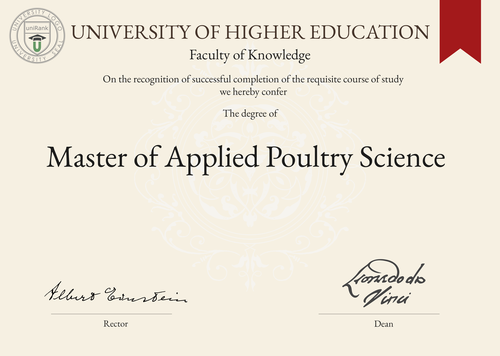
Master of Applied Poultry Science (M.A.P.S.)
Guide to Master of Applied Poultry Science Program/Course/Degree
Master of Applied Poultry Science (M.A.P.S.)

Program Name:
Master of Applied Poultry ScienceProgram or Degree abbreviation:
M.A.P.S.Duration range:
The duration of the program can vary depending on the country or university, typically ranging from 1 to 2 years.Tuition range:
Tuition fees for the Master of Applied Poultry Science program can vary based on the chosen country or university, with ranges varying from $10,000 to $30,000 per year.Overview:
The Master of Applied Poultry Science program is designed to provide students with advanced knowledge and skills in the field of poultry science. It focuses on the practical application of scientific principles to the management and production of poultry. Students gain a deep understanding of poultry nutrition, genetics, health and welfare, as well as the latest advancements in poultry production systems.Curriculum Overview by year:
The curriculum for the Master of Applied Poultry Science program typically includes a combination of core courses, elective courses and a research project or thesis. The specific courses offered may vary by university, but generally cover topics such as poultry nutrition, poultry health and diseases, poultry genetics and breeding, poultry production systems and poultry business management.Key Components:
The key components of the Master of Applied Poultry Science program include in-depth knowledge of poultry science, hands-on practical training, research experience and the development of critical thinking and problem-solving skills. Students also have the opportunity to network with industry professionals and gain valuable industry insights through internships or industry collaborations.Career Prospects:
Graduates of the Master of Applied Poultry Science program have a wide range of career opportunities in the poultry industry. They can work as poultry farm managers, nutritionists, breeders, consultants, researchers, or in various roles within poultry production and management companies, government agencies, or research institutions.Salary Expectations:
Salary expectations for graduates of the Master of Applied Poultry Science program can vary depending on factors such as the country, job position and level of experience. On average, professionals in the poultry industry earn salaries ranging from $40,000 to $80,000 per year.Conclusions:
It is important to note that the duration, tuition fees, curriculum, key components, career prospects and salary expectations of the Master of Applied Poultry Science program can vary based on the chosen country or location of study, as well as the specific university offering the program. Prospective students are encouraged to research and compare different universities and countries to find the best fit for their academic and career goals. Visitors can search for where this specific degree, Master of Applied Poultry Science, is offered anywhere in the world through the uniRank World Universities Search Engine.World Universities Search Engine
search for Master of Applied Poultry Science (M.A.P.S.) and add the Location (country, state etc.) or specific University you are interested in studying at.
Query examples:
- Master of Applied Poultry Science (M.A.P.S.) United States
- Master of Applied Poultry Science (M.A.P.S.) United Kingdom online
- Master of Applied Poultry Science (M.A.P.S.) Australia international students
- Master of Applied Poultry Science (M.A.P.S.) University of California
- Master of Applied Poultry Science (M.A.P.S.) University of London tuition fees
- Master of Applied Poultry Science (M.A.P.S.) University of Sydney scholarships
Share Program/Course
Interesting? Share this program/course/degree info with your friends now.